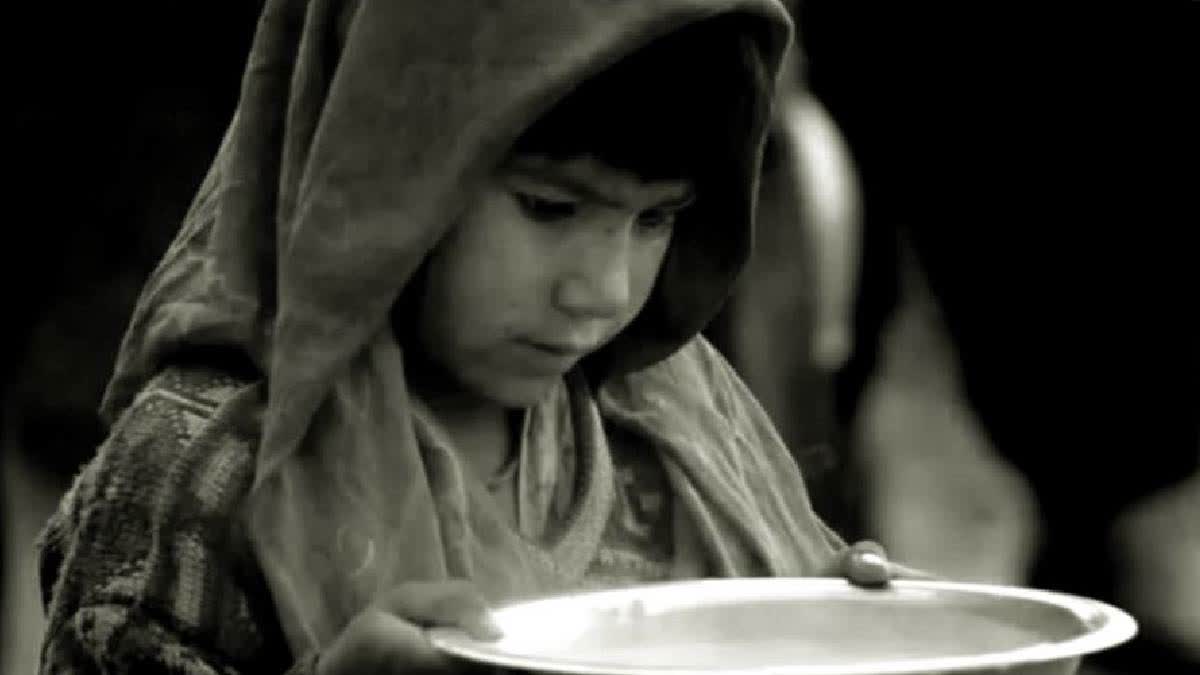Hyderabad: Despite seven and a half decades of independence, the pursuit of nutritional security and a wholesome life remains a distant dream for countless citizens within our nation. The well-being of millions of children is marred by the relentless spectre of malnutrition; a plight they endure right from the moment of their birth.
The World Hunger Index (WHI), a stark reflection of our nation's dire circumstances, chronicles this disheartening narrative. In 2020, India held the 94th position on this index, but in the ensuing years, our standing plummeted to 101, then further to 107. Presently, India finds itself relegated to the 111th place among 125 nations in the latest rankings. The disconcerting evaluation on this index amalgamates four vital indicators that together capture the multidimensional nature of hunger—undernourishment, child stunting, child wasting, and child mortality.
In sharp contrast to this unnerving reality, the central government has contested the findings of the World Hunger Index, labelling it as a "flawed measure of hunger" that fails to accurately depict India's true standing. Yet, the Comprehensive National Nutrition Survey of 2016-18 had sounded an ominous warning: the spectre of food scarcity has extended its reach beyond the confines of Bihar, Madhya Pradesh, Uttar Pradesh, and Rajasthan. The report unequivocally declares that malnutrition among children under the age of five is on the rise, painting a grim portrait of our nation's health. Recent research conducted by the Centre for Science and Environment (CSE) found that a staggering 71 percent of Indians grapple with malnutrition, an affliction that claims the lives of 1.7 million individuals annually.
Dismissing the Hunger Index becomes an exercise in futility when studies conclusively establish that malnutrition is the cause of death for 68 percent of children suffering from stunted growth below the age of five. Regrettably, numerous mothers in the country are mired in anaemia, and infant malnutrition continues to claim innocent lives. Alarming revelations surfaced in a report by the Parliamentary Standing Committee, chaired by Dr. Vinay Sahasra Buddhe, as it shed light on the ineffective utilisation of funds allocated for crucial schemes such as Poshan Abhiyan and Pradhan Mantri Matru Vandana Yojana (PMMVY).
Bearing witness to the heart-wrenching truth that citizens are succumbing to hunger-induced fatalities despite the country making rapid progress on other fronts, the Apex Court has resorted to directing the distribution of ration commodities to as many people as possible. Considering these troubling findings and the urgent cries for help from within our nation, it is paramount that the voids in governance be swiftly addressed, accompanied by a humane and compassionate spirit.
The report from the Fifteenth Finance Commission emphatically underscores that malnutrition in children constitutes a substantial impediment to the progress of our nation. Complementing this perspective, NITI Aayog has affirmed that proper breastfeeding can potentially alleviate 60 percent of the affliction of stunted growth in children. The veracity of this assertion is undeniable, for how can mothers provide natural nourishment when they themselves grapple with anaemia?
Countries that grasp this fundamental principle and act upon it with conviction invariably witness significant progress on multiple fronts. Nepal stands as a shining exemplar, having achieved commendable strides in maternal and childcare by virtue of its well-executed nutrition plans and unwavering attention to new-borns and nursing mothers. Bangladesh, too, offers a compelling narrative of transformation. Just a quarter-century ago, it grappled with a high prevalence of underweight children. Yet, by prioritizing maternal education, promoting healthcare, hygiene, and implementing robust healthcare initiatives, the country has undergone a remarkable metamorphosis.
Regrettably, disparities back home paint an alarming picture. The World Hunger Index alarms us with the revelation that 18.7 percent of Indian children are underweight for their height. The National Family Health Survey (NFHS) underscores the magnitude of this issue, with 19.3 percent of boys and girls falling within this category. Furthermore, more than 35 percent of stunted children in our country bear the enduring consequences of malnutrition.
At the heart of addressing this crisis lie the 14 lakh Anganwadi facilities spread across the nation, tasked with providing nutrition to approximately 10 crore children, infants, and nursing mothers. However, these well-intentioned establishments grapple with numerous impediments, from staff vacancies to monitoring challenges and distribution inconsistencies, rendering them less effective than envisioned.
Also Read: Amit Shah stresses on eliminating malnutrition among children
The words of Prime Minister Modi resonate with absolute truth: a healthier citizenry is the bedrock upon which the edifice of a new India can be constructed, only when nutritious food is made accessible to everyone. Thus, governments must adopt resolute measures. Food and nutrition schemes should be implemented impartially, while those engaging in corrupt practices should face stern consequences. Failing to infuse vitality and nourishment into the future generations of our nation would indeed jeopardize the very essence of our country's future.
Also Read: UN says 2.4 billion people didn't have constant access to food last year


